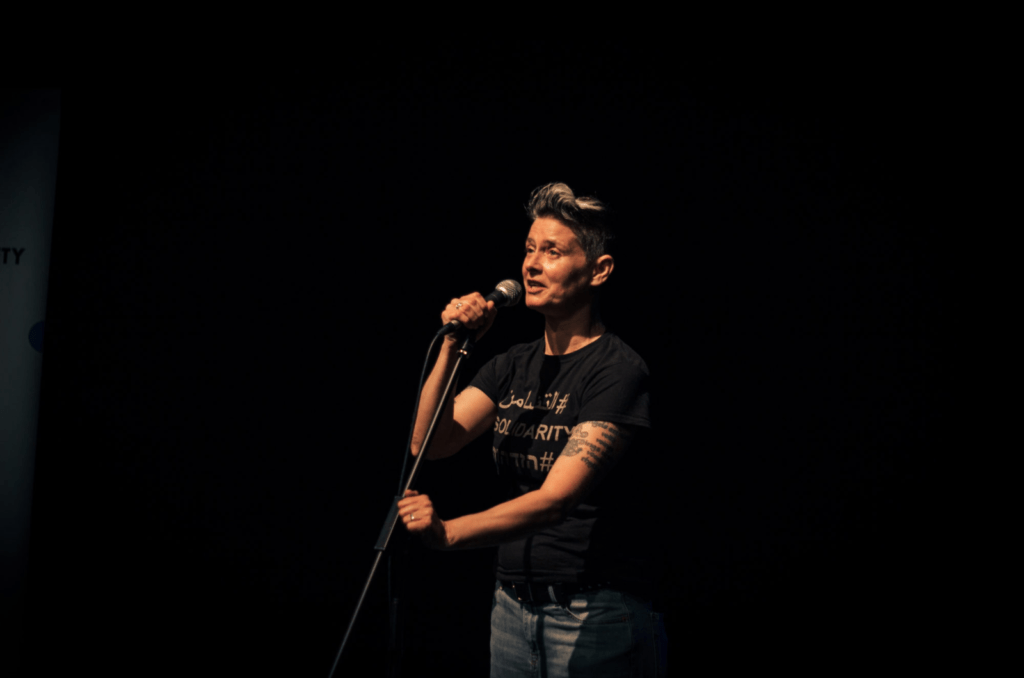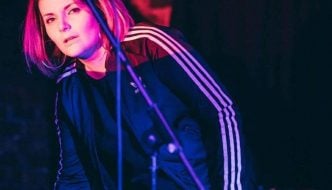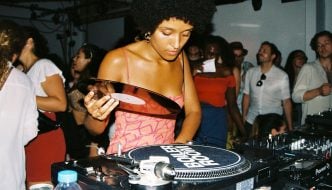
Joelle Taylor, credit: Karim Kamar for The Poetry Society
It’s been a few weeks now since the GCSE Poetry row had everybody at their keyboards. Most folk were offering balanced opinions and searching for nuance, but as usual, the polarised views received the most attention. Now that the dust has settled a tad, I’d like to have a go mesen.
Before the lockdown, I’d guess that on average, around 60% of my monthly income came from educational work. This was in the form of visiting schools around the UK to deliver poetry workshops to Year 1 through to Year 13. I don’t have any teaching qualifications, but ‘poets in schools’ is quite a popular venture and something that I personally have been developing since 2013.
The fact is, I don’t have any qualifications whatsoever beyond my underwhelming A-Levels: none of which were English. It’s just a passion for poetry and the ability to articulate that in a way that engages and, hopefully, inspires pupils. And the freedom to be able to present and explore poetry in a way that ignites their imaginations, as opposed to putting the fear of God into them.
See, in my view, this is the principal problem with poetry in schools. It’s not taught to be enjoyed or used as a tool for expression: it’s almost taught like algebra. Pulled apart and analysed, and then at GCSE level, forced to be etched onto the brain, regardless of any prior level of enjoyment for the poem. It’s a torturous experience that leaves its mark right through to adulthood.
Another problem with poetry in schools is the poetry on the syllabus. The general lasting impression is that it’s dull, old-fashioned, fey, and almost impossible to relate to. Poems by white geezers who’ve been dead for an extremely long time, using the kind of language that you’d only ever hear in… well, GCSE poetry.
It’s not a dead art-form or a male art-form or a white art-form and shouldn’t be taught as either. If pupils are being forced to painstakingly analyse poems that very rarely engage them in the first place, it’s hardly going to be a roaring success, is it?
So, what can we do differently? Well, it’s vital for me to say at this stage that I don’t place any of the blame on the teachers. For the same reasons outlined above, they’re facing a colossal uphill battle when it comes to inspiring pupils with poetry, and I can’t imagine that it’s the favourite topic for too many English teachers out there.
I also concede that poetry, like all other art-forms, is highly subjective, and so simply encouraging pupils to write their own poem by way of a GCSE exam would be massively difficult to assess academically. We need to maintain some elements of the current system, otherwise it becomes messy and creates a whole new world of problems itself.
But as somebody who only properly started reading poetry in my mid-20s, it’s painfully obvious to me that completely overhauling the poetry on the syllabus would be the most effective way of improving the situation. Even if it’s on a three-year cycle: give the teachers something fresh to work with, and show the pupils the immense range of engaging, exciting, relevant, diverse, and electrifying range of poetry that exists in the 21st century.
If pupils opened their anthologies and found poems by Salena Godden, Kae Tempest, Danez Smith, Joelle Taylor, Buddy Wakefield, Sabrina Mahfouz, Raymond Antrobus, Morgan Parker, Fatimah Asghar, Shane Koyczan, and a whole range of other contemporary poets, the landscape would transform overnight.
If pupils read poetry that reflects, challenges, narrates, and explores the same world that they inhabit. Be that politically, culturally, or geographically or in terms of race, gender, sexuality and more. Then surely pupils are far more likely to grab poetry by the scruff of the neck and see it as an art-form that can champion and empower them. As opposed to just being another topic to stifle and confuse them during the already overwhelming build-up to GCSE exams.
I’m sure this all seems fantastical and farfetched to some. I get that. And why should some loud-mouth self-taught poet with zero formal academic training feel that he has a say on such an important issue… ?
Well, all I’m saying is, I loathed poetry at school. Absolutely detested it from start to finish. And if I’d been given a chance to swerve it at GCSE, I’d have been buzzing. This is how – when I enter a classroom – I know that there’ll be eyerolls and deep sighs when I introduce myself as a poet.
But double that lifespan later, and I see every day how poetry changes people’s lives. It gives them a voice for the first time and allows them to navigate their universe with language. And if those same eyerolling pupils were to go to a Raise the Bar event in Bristol for example, or an Out-Spoken event in London, or a Wordlife event in Sheffield, they’d be blown away.
Surely, we can bridge that gap, and create a link between the poetry that’s enjoying a global renaissance, and the poetry that’s being taught to future generations? Look at what Joelle Taylor has achieved with SLAMbassadors and tell me that poetry doesn’t inspire young folk. Add the fact that so much contemporary poetry exists on Instagram and YouTube – places already obsessed over by most pupils nowadays – and you’re already halfway there.
There would of course be arguments as to who gets to decide, still. Some would say it should be the quarter-finalists of the Roundhouse Poetry Slam every year. Some would say it should be the latest Forward Prizes anthology. But I’m sure we could assemble a diverse panel of poetry-based professionals who could give it the shake-up that it needs in 2020.
To summarise. I am extremely passionate about poetry. And I believe that poetry should enjoy just as much importance in schools as any other subject. But as far as I can see, we’re doing it a gross injustice. And if the recent GCSE Poetry row forces us to completely overhaul how poetry is taught in schools, then I say that overhaul couldn’t come soon enough.
Matt Abbott is a poet, educator, and activist from Wakefield. His debut one-man show Two Little Ducks earned 5* reviews at Edinburgh Fringe 2017 and on a UK theatre tour in 2018. It was published as his debut poetry collection by Verve Poetry Press in 2018. His debut kids’ poetry collection A Hurricane in my Head was published by Bloomsbury Education in 2019.
Matt runs independent spoken word record label Nymphs & Thugs and fronts alternative indie band Skint & Demoralised. He’s an ambassador for Eureka! The National Children’s Museum and Trinity Homeless Projects.
Filed under: Written & Spoken Word
Tagged with: analysis, buddy wakefield, Danez Smith, education, english literature, Fatimah Asghar, gcse, grades, Joelle Taylor, Kae Tempest, Morgan Parker, old-fashioned, passion, poem, poet, poetry, Raymond Antrobus, Sabrina Mahfouz, Salena Godden, schools, Shane Koyczan, syllabus



Comments